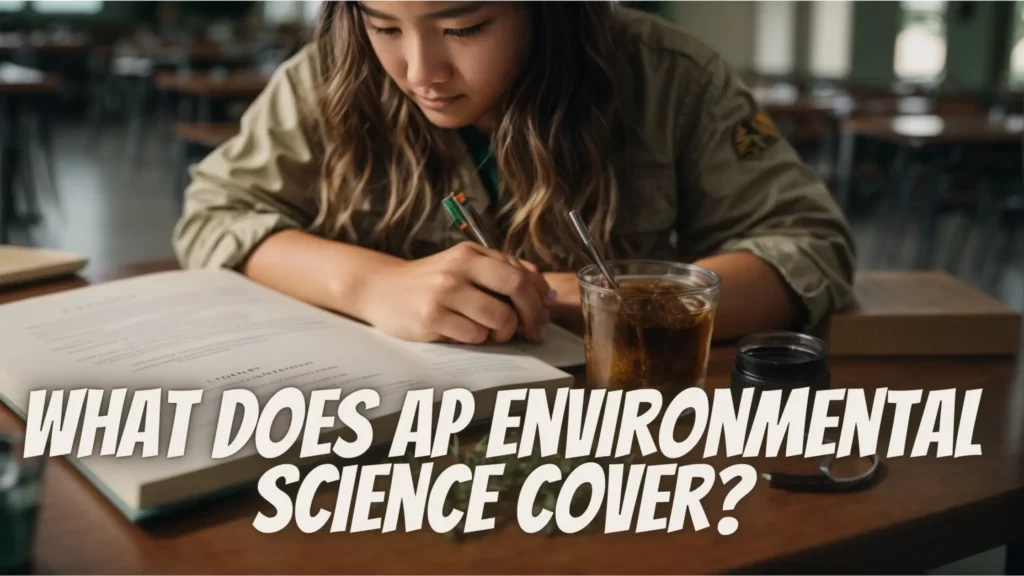Should I Take AP Environmental Science? A Helpful Guide

Should I take AP Environmental Science? This guide will provide factual details about AP Environmental Science, helping you make an informed decision. Covering topics such as
- Should I Take AP Environmental Science?
- What Does AP Environmental Science Cover?
- The Pass Rate Of AP Environmental Science
- The Course Material Of AP Environmental Science
- How Is the AP Environmental Science Exam Structured?
- 5 Reasons Not to Take/to Take AP Environmental Science
- Is AP Environmental Science Worth Taking?
And many more that can be helpful for you. So, without any delay, let’s get started.
Key Takeaway
- AP Environmental Science is best for those passionate about environmental topics.
- Consider college and career goals; the course can save time and money in the long run.
- Seek resources and support to improve your learning experience.
- Consult educators for valuable understanding.
- Taking AP Environmental Science can lead to potential college credits and a head start in related areas.
Table of Contents
Should I Take AP Environmental Science?
AP Environmental Science is an advanced high school course that delves into various aspects of the environment, including ecology, conservation, environmental issues, and Sustainability. Here’s a more detailed exploration of the factors to consider when deciding whether to take this course:
Interest And Passion
Your interest in the subject matter is paramount. AP Environmental Science can be a captivating and meaningful course if you have a genuine passion for the environment, Ecology, or Sustainability. You’ll explore real-world environmental problems and potential solutions.
Academic Preparedness
Consider your academic strengths, especially in online science classes and math classes. AP Environmental Science combines elements of Biology, chemistry class, and Earth Science. While a strong background in these areas is helpful, a willingness to learn and work hard can lead to success.
College And Career Goals
Think about your post-high school plans. If you intend to pursue a college degree related to environmental science, Biology, or any STEM field, taking this AP course can bolster your college application and earn you college credit, saving you time and money.
College Credit Opportunities
AP courses culminate in an AP exam. Scoring well on this exam can earn you college credit or advanced placement in college courses. Check with colleges you’re interested in to see if they accept AP Environmental Science credits.
Workload And Time Management
AP courses are known for their rigorous coursework. Assess your ability to manage your time effectively, as you’ll likely have more homework and studying to do. Balancing your workload with other commitments is essential for success.
Resources And Support
Investigate available resources, such as textbooks, labs, and teacher expertise. A well-equipped and knowledgeable teacher can significantly enhance your learning experience.
- AP Environmental Science Crash Course
- Barron’s AP Environmental Science
- Cracking the AP Environmental Science cases to Take My Exam For Me
- 5 Steps to a 5: AP Environmental Science
- Barron’s AP Environmental Science Flashcards
Extracurricular Interests
Consider your involvement in extracurricular activities. Make sure that taking this AP course won’t overload your schedule and negatively impact your participation in other clubs or sports.
Personal Values
Reflect on your values and interests. Suppose you’re genuinely concerned about environmental issues, conservation, and Sustainability. In that case, this course aligns with your values and allows you to contribute to positive change.
Consult With Educators
Seek advice from your high school counselor or science teachers. They can provide valuable insights into the course’s difficulty level, the workload, and whether it fits your academic profile well.
Taking AP Environmental Science can be a valuable decision if you are genuinely interested in the subject matter, academically prepared, and have a clear path toward college and career goals in fields related to environmental science.
It’s also crucial to assess your ability to manage the workload effectively and ensure it aligns with your academic and personal commitments. Ultimately, your decision should be based on your passion for the subject and long-term educational and career aspirations.
150+ ![]()
Qualified Tutors
What Does AP Environmental Science Cover?

At its core, Take My Online Environment Class is a multidisciplinary exploration of the environmental complexities that shape our world. It marries elements from biology, chemistry, ecology, geology, and geography to provide a holistic understanding of the intricate web of interactions within Earth’s ecosystems.
Here’s an overview of the primary topics covered in the course:
| Course Component | Description |
| Ecology | Investigating ecosystems, populations, and communities. |
| Biodiversity | Exploring the rich tapestry of life on our planet. |
| Environmental Ethics | Considering moral dilemmas in environmental decision-making. |
| Environmental Policy | Analysing rules and regulations shaping the environmental landscape. |
| Climate Change | Understanding the scientific basis of global climate change. |
| Human Population | Observing demographic trends and their environmental implications. |
The course material, therefore, spans from studying ecological dynamics to evaluating the ethical considerations of environmental policies.
The Pass Rate Of AP Environmental Science
Before delving further into the depths of AP Environmental Science, let’s explore one crucial data point: the pass rate. It’s natural to wonder how many students successfully navigate this academic voyage.
The AP Environmental Science exam varies from year to year. Still, it generally hovers around 50% or slightly higher. This implies that approximately half of the students who undertake the course earn a passing score of 3 or higher on the exam.
It’s important to note that while the pass rate might seem modest, it shouldn’t deter you from considering the course. Many factors contribute to the pass rate, including the diversity of student backgrounds, the quality of instruction, and individual study habits. Your commitment and approach to the course can significantly influence your chances of success.
The Course, Material Of AP Environmental Science
Diving into the specifics of the AP Environmental Science curriculum is pivotal in assessing whether this course aligns with your academic interests. Here’s a more detailed breakdown of the topics covered:
1. Ecology
- Ecosystem Structure: Exploration of various ecosystem types and their components.
- Energy Flow: Understanding how energy flows through ecosystems.
- Biogeochemical Cycles: Investigating the cycling of essential elements like carbon, nitrogen, and phosphorus.
- Population Dynamics: Analysing the factors that influence population growth and decline.
2. Biodiversity
- Species Diversity: Exploring the vast array of species on Earth.
- Ecosystem Services: Recognizing the critical role biodiversity plays in sustaining ecosystems.
- Threats to Biodiversity: Investigating factors leading to species endangerment and extinction.
3. Environmental Ethics and Philosophy
- Ethical Decision-Making: Delving into the moral considerations involved in environmental choices.
- Philosophical Perspectives: Examining different philosophical approaches to environmental issues.
4. Environmental Policy and Regulation
- Legislation: Studying local, national, and global environmental laws and regulations.
- Environmental Impact Assessment: Evaluating the environmental consequences of human activities.
5. Climate Change
- Greenhouse Effect: Understanding the heat-trapping mechanism in the Earth’s atmosphere.
- Climate Models: Exploring climate prediction models and their implications.
- Mitigation and Adaptation: Analyzing strategies to address and cope with climate change.
6. Human Population
- Demographic Trends: Examining population growth patterns and their environmental impacts.
- Resource Consumption: Investigating the relationship between population and resource utilization.
This comprehensive curriculum offers practices and diverse educational experiences, but assessing whether these topics align with your academic passions is essential.
150+ ![]()
Qualified Tutors
How Is the AP Environmental Science Exam Structured?
The AP Environmental Science exam is the culmination of your coursework. To succeed, it’s vital to understand its structure and components.
The exam has two main sections:
1. Multiple-Choice Questions:
- This section accounts for 60% of your general score.
- It includes 80 multiple-choice questions.
- You have 90 minutes to complete this section.
2. Free-Response Questions:
- This section accounts for 40% of your general score.
- It consists of three free-response questions: one data-set question, one document-based question, and one synthesis and evaluation question.
- You have 90 minutes to complete this section.
Developing strong analytical and critical thinking skills is crucial for the exam. The free-response questions, in particular, demand the ability to synthesize information, analyze data, and construct well-reasoned arguments.
5 Reasons Not To Take AP Environmental Science

While AP Environmental Science offers many educational benefits, it’s only for some. Here are five reasons you might not consider taking the course:
1) Lack of Interest: If you have little to no interest in Environmental Science, Ecology, or Sustainability, the course may not align with your passions.
2) Heavy Workload: AP courses are known for their rigorous coursework and substantial homework load. If you’re juggling multiple commitments or prefer a lighter academic schedule, this course might not be the best fit.
3)Prerequisite Courses: Some schools require AP biology or chemistry prerequisites before enrolling in AP Environmental Science. It could be a barrier if you still need to complete these prerequisites.
4) Limited Career Relevance: If your career aspirations do not involve Environmental Science, Ecology, or related fields, the course may not provide a significant advantage in your chosen path.
5) Alternative AP Courses: Numerous other AP courses are available, each catering to different academic interests. Exploring alternative AP courses that align more closely with your goals might be worth exploring.
5 Reasons to Take AP Environmental Science
Considering whether to take AP Environmental Science, it’s natural to wonder about the practical knowledge you’ll gain. Here are five reasons you might consider taking the course:
1) Environmental Awareness: Develop a deep understanding of environmental issues facing our world, from biodiversity loss to climate change.
2) Scientific Skills: Hone scientific inquiry and critical thinking skills as you analyze data, conduct experiments, and make informed conclusions.
3) Ethical Considerations: Explore the ethical dilemmas intertwined with environmental decision-making and develop a sense of environmental stewardship.
4) Policy Insights: Gain insights into environmental laws, regulations, and policies, equipping you to engage with environmental issues from a legal and policy perspective.
5) Resource Management: Understand the dynamics of resource utilization, population development, and their consequences for the environment.
Is AP Environmental Science Worth Taking?
Ultimately, taking AP Environmental Science hinges on your unique academic aspirations, interests, and goals. To assist you in reaching an informed verdict, consider the following aspects:
Passion for the Environment: If you possess a genuine passion for Environmental Science, Ecology, and Sustainability, this course can be an enriching experience that aligns with your interests.
College Credit: Earning a high score on the AP exam can earn you college credit, allowing you to bypass introductory-level courses in college and delve into more advanced coursework.
Environmental Advocacy: If you aspire to advocate for environmental causes, whether through scientific research, policy advocacy, or education, the knowledge gained in this course can be invaluable.
Interdisciplinary Appeal: AP Environmental Science’s multidisciplinary nature makes it a unique chance to explore the intersection of various scientific disciplines and ethical considerations.
Career Alignment: If you plan to pursue a career in environmental science, Ecology, Biology, Environmental law, or related fields, this course provides a strong foundation.
One significant advantage of enrolling in AP courses is the opportunity for potential tuition savings throughout your college journey. Students who begin college with AP credits may have the chance to graduate ahead of schedule, delve into minor fields of study, or even pursue a double major.
Below, a table illustrates the potential tuition and fees at select popular U.S. colleges that acknowledge AP Environmental Science exam scores for credit.
| School | Minimum Score Required | Tuition and FeesGraduate | Tuition and FeesUnder-Graduate |
| Boston University | 4 | $61,924 | $62,360 |
| University of San Francisco | 3 | $28,060 | $55,532 |
| University of Maryland | 4 | In-State:$17,448 Out of state:$36,598 | In-State:$11,233 Out of state:$39,469 |
| Northwestern University | 5 | $53,024 | $63,468 |
| Auburn University | 4 | In-State:$12,170 Out of state:$32,942 | In-State:$12,176 Out of state:$32,960 |
| New York University | 4 | $39,592 | $58,168 |
| University of Florida | 3 | In-State:$12,737 Out of state:$30,130 | In-State:$6,381 Out of state:$28,659 |
| George Washington University | 4 | $33,984 | $60,946 |
Considering the academic advantages and potential financial savings, it becomes evident that taking the AP Environmental Science exam is a valuable choice.
FAQs
1) What Does AP Environmental Science Count As In College?
Colleges and universities often grant credit or advanced placement to students who perform well on the AP Environmental Science exam. The specific credit policies vary by institution, but earning a high score (typically 4 or 5) can allow you to skip introductory-level environmental science courses.
2) Is AP Environmental Science The Hardest AP?
The perception of difficulty varies from student to student and depends on your academic strengths and interests. AP Environmental Science is challenging in its own right, as it combines elements from multiple scientific disciplines and explores complex environmental issues.
However, it might be considered the least challenging AP course compared to subjects like AP Calculus BC, AP Physics C, or AP Chemistry, renowned for their mathematical and theoretical rigor.
3) What Does AP Environmental Science Go Over?
As detailed earlier, AP Environmental Science covers various topics, including ecology, biodiversity, environmental ethics, environmental policy, climate change, and human population dynamics. The course aims to give students a comprehensive understanding of environmental science, incorporating scientific principles, ethical considerations, and policy perspectives.
4) How Much Homework Does AP Environmental Science Have?
The amount of homework in AP Environmental Science can change from school to school and teacher to teacher. However, like most AP courses, you can expect a significant workload. Homework assignments may include reading, research, data analysis, class discussion, and lab preparation.
Conclusion
Taking AP Environmental Science should be based on your genuine interest, academic readiness, and long-term goals. This guide provided insights into the course content, exam structure, and reasons to consider or reconsider it.
If you’re passionate about the environment and pursuing related fields, this course can offer valuable knowledge and potential college credits. However, it comes with a demanding workload, so carefully considering your commitments is essential.
Consulting with educators and assessing personal values can further inform your choice. Ultimately, taking AP Environmental Science can be a rewarding step towards a future in environmental science or related disciplines.
I am a Natural sciences enthusiast with a profound passion for Biology, Chemistry, Statistics, and Physics. Completed more than 1055+ online classes and exams for the students. So they score high and stress less!
Discount
On Your First Order




